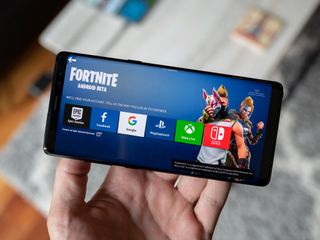Google plans to get Epic's Fortnite antitrust case dismissed before it even begins

What you need to know
- Google has announced that it would bring a motion to dismiss the complaint filed against it by Epic Games.
- Epic Games filed a lawsuit against Google after the search giant removed Fortnite from the Play Store last month.
- Google has also opposed merging Epic Games' Android and iOS cases.
Epic Games' widely-popular mobile game Fortnite was removed from both the Apple App Store and Google Play Store last month, after the developer rolled out an update allowing users to make in-app purchases directly. Shortly after its removal from the Play Store, Epic Games filed a lawsuit against Google to "end Google's unlawful monopolization and anti-competitive restrains." Google has now announced that it will bring a motion to dismiss Epic's complaint (via Foss Patents).
A filing made on Google's behalf by Morgan Lewis' Brian Rocca, confirms the search giant plans to challenge Epic's complaint "based on circumstances unique to Android:"
Once served, and only after the initial scheduling is worked out, Google will challenge the complaints, in large part based on circumstances unique to Android, just as it did in Feitelson v. Google, Inc.
The filing also reveals that Google does not want the Android and iOS cases to be merged. However, the search giant is in favor of combining Android and Play Store antitrust cases, including the Pure Sweat Basketball and Carr v. Google cases that are currently pending.
The search giant argues in the filing that the Android and iOS cases do not overlap each other, other than the fact that both platforms compete against one another to attract app developers and end users. Google's lawyers also point out that Google and Apple's business models and agreements to support rival ecosystems are very different:
While Apple's iOS allows the distribution of apps only through Apple's proprietary app store, Android devices, in contrast: (1) can have multiple app stores simultaneously pre-installed or downloaded and (2) allow for end users to sideload apps via the Internet. That means Android app developers can distribute apps through multiple Android app stores, work directly with OEMs or carriers to preload apps, and distribute apps to users directly from their own websites. As a result, Apple and Google each have their own separate and unique negotiations and contracts with app developers and original equipment manufacturers (OEMs).
How to install Fortnite on your Android phone following Google ban
Be an expert in 5 minutes
Get the latest news from Android Central, your trusted companion in the world of Android

